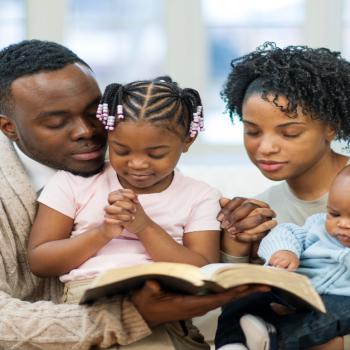Editors' Note: This article is part of a Public Square conversation on Civil Religion. Read other perspectives here.
"We're all in this together": this is the phrase I use to sign my emails these days. These five words are shorthand for my core beliefs about the heart of Christianity, the heart of democracy, and the way that people of faith can engage the public conversation on behalf of the common good, with some measure of "religious civility."
I made this phrase my email signature in the spring of 2010, after hearing author and educator Parker Palmer name this as one of the "habits of the heart" necessary to revive our broken democracy and revive a sense of public life in a time of hyper-individualism. (He was speaking at a retreat entitled "The Politics of the Brokenhearted" and has since published his work on habits of the heart in his 2011 book Healing the Heart of Democracy: The Courage to Create a Politics Worthy of the Human Spirit.)
To say "we're all in this together" is to say that we are all connected, dependent upon one another and accountable to one another and responsible for the web of all life, human and otherwise, that stretches across our fragile planet.
To say "we're all in this together" is to say not only that are we interconnected, but also that not one of us is superior to any other. My religion is not better than yours, and neither is my ethnicity, my gender, my nationality, my generation, my politics, nor any of the other markers that create my individual identity.
What might this look like in practice, with an eye to the role of civil religion today?
For starters, it means that as a progressive Christian, I do not privilege my religion over anyone else's. My goal is not to convert you or to convince you of the correctness of my position. My goal is not to hold a litmus test up to your beliefs and practices to see whether you pass muster. My goal instead is to listen to your story first, and then share my own, trusting that we will both be surprised by our points of commonality.
And it means that as a member of our democracy—a democracy in serious need of revival—I do not enter the public conversation to win the debate or score a victory for my team, but rather to see how we can attend to the common good. This sounds idealistic, to be sure, and just about impossible on a national scale. Perhaps the only way we can do this is to start locally—to look up from our screens to see what's happening on our street and in our neighborhood, to ask some questions and listen hard for some answers. How is the town library doing? What issues do your local teachers face? Are the children safe? Is fracking threatening your community? Who is being harmed? Who else might care? Where can we make fresh alliances? How can we be good neighbors to one another in this place, at this moment?
And it means keen attention not only to the world around us, but also to our inner lives, so that we can find our authentic voices to speak with integrity. It means recognizing our self in that other, and seeing the shadow within ourselves, acknowledging both our better and our lesser angels. It means holding opposites in tension through the long process of reaching understanding. It means not jumping to resolution of differences but spending time on bridge-building. It means remembering that the common parlance of all the world's great religions is compassion.
None of this is easy. All of it takes time and attention and hard work. To enter the public square believing that we really are all in this together is just one small step toward the practice of a faith that engages the body politic on behalf of the common good. It's one small step, and it's an act of hope: hope that people of faith might become known as champions for the poor, for the planet, and for peace.
10/29/2013 4:00:00 AM




